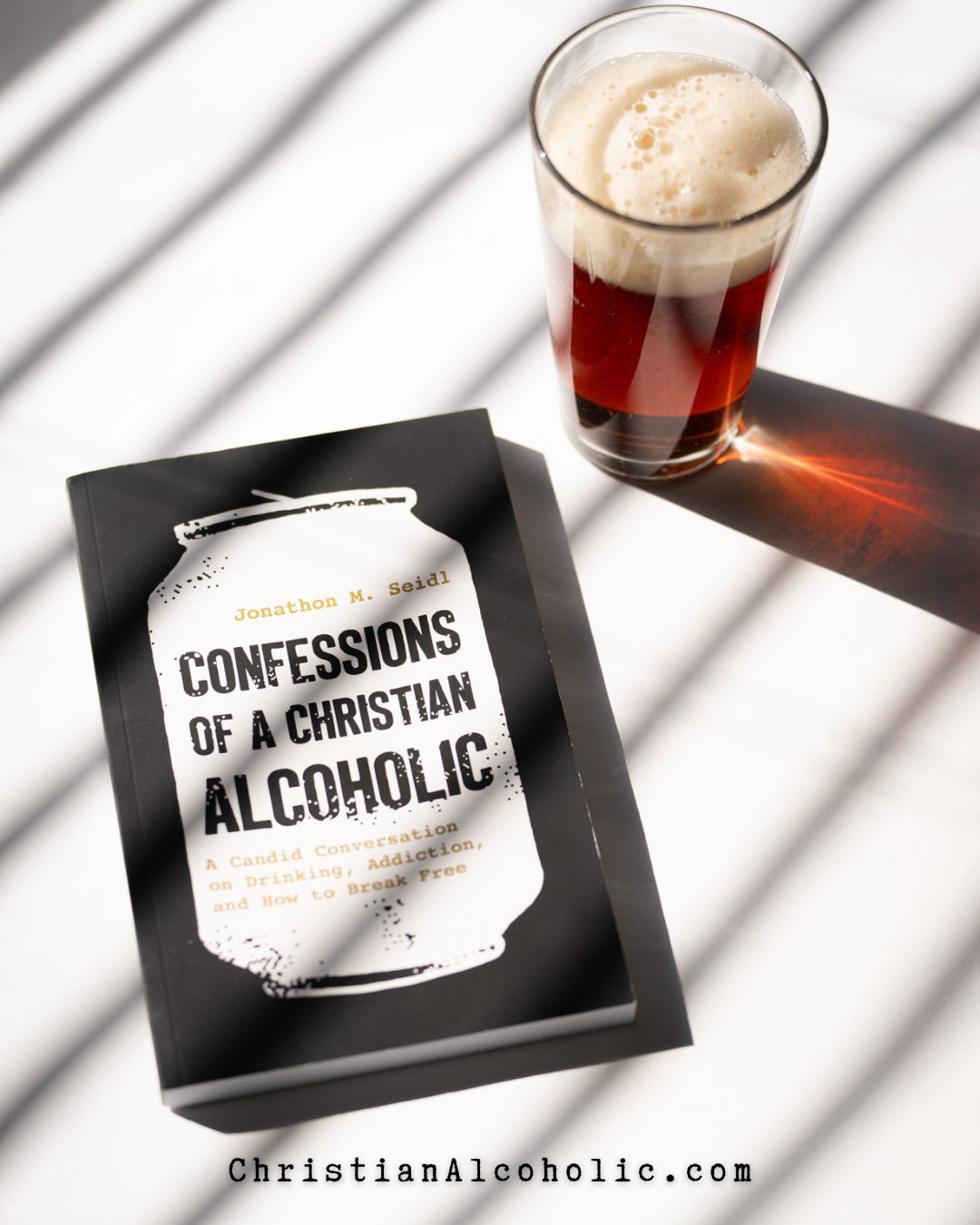Why some 'experts' don't want me saying what I'm saying. (With email proof.)
I'm facing backlash. Does that mean I'm doing something right?
You might think that a message of hope in Jesus as the ultimate goal of addiction recovery isn’t controversial in Christian circles.
It is.
And I wanted to share two pieces of feedback I’ve gotten regarding my new book and explain why what I’m saying is making some people unhappy.
First of all, let me be really clear about two things:
I am not categorically against AA (Alcoholics Anonymous) or other 12-step recovery programs. I explain this in my book.
HOWEVER, I think many of the traditional 12-step programs, including AA, don’t go far enough and end up missing the main thing that leads to the most flourishing and fulfilled life (as well as eternal life): Jesus.
In the end, my thesis is simple: Aim for sobriety, and you may get it. Aim for Jesus, and you’ll get sobriety thrown in.
I was delivering that message on a national radio show yesterday morning. It went well, and the host “got” what I was saying. However, I woke up this morning to an email from a listener who wasn’t happy with me. Here is what the man, we’ll call him Don, said:
I hope I heard what you meant to say on The Reconnect when you said the focus of AA is lacking because it largely (solely?) focuses on “ sobriety. I have benefited from involvement in NA for 40 years and have many ties with those who are active in AA. I would encourage you to make a careful application of the core of the organization, the 12 steps, in your own life and see how it benefits you. Your assessment is one that would be equivalent to dismissing Christianity as gauged by interaction with those who seek to keep the commandments by their own strength. God bless.
I’ve gotten versions of this kind of pushback since I started sharing my story and breaking with what we call the “old hats” in addiction recovery. In the end, there is a fear that people like me who elevate Jesus above the program are doing a great disservice to those who need help.
Is that true?
Well, let me share with you what I wrote back to Don:
Hey [Don],
First of all, congratulations on 40 years. That’s amazing! I’m so happy for you. As I said on the show, I am not against AA or other 12-step programs. Sometimes, though, when you only have a few minutes certain nuance can get left out. I think that’s what you’re picking up on.
However, in the end I do believe the Jesus-based recovery is the best type of recovery because it leads to a more flourishing, fulfilled life. Not “higher power” based, but Jesus-based. Unfortunately, too many AA groups now have become hostile to people who want to talk about Jesus as their higher power. Perhaps that is not your experience, and I’m grateful for that, but it is becoming all too common.
I don’t think it’s controversial to say that AA focuses on sobriety and not Jesus, which is what I was trying to say. Not just a higher power, but Jesus. And while certainly some people eventually find Jesus or use him as their higher power, I want to advocate for any program that does that solely and right off the bat. Additionally, I’ve met too many people who have traded their addiction to a substance for an addiction to meetings.
I do talk more about this in the book, and I think you would benefit from reading my full discussion to get all the angles and nuance. But if not, know that I am cheering you on and have advocated for people to go to AA (even family members). My encouragement, though, is to use it as a gateway to more of Jesus.
Hope that helps.
I want to make this clear again: I think you can go to AA and be a Christian. You can go to AA and love Jesus. I have friends that do it. I just think that, increasingly, the environment of modern AA is not the most conducive to pursuing Jesus. And ultimately, you need to be pursuing Jesus! As a Christian, that’s what I’m called to advocate for.
(At this point many point out to me that AA was founded on Christian principles. I don’t disagree with that. But being founded on Christian principles and advocating for Christ are two very different things. The modern version of AA has, in many ways, lost its way. Can you go through modern AA and end up finding Jesus? Of course. But why would I not advocate more strongly for aiming for Jesus from the outset?)
However, Don isn’t the only one that doesn’t like what I’m saying. When I was first writing my book I interviewed a former Baptist minister who became an alcoholic and lost his church. My heart went out to him, because instead of him being supported by the congregation and elders of his church he was ostracized and cut off. He has since become pretty popular expert in addiction recovery circles, even doing work with some big national organizations. I asked him some detailed questions and thought we had a great conversation. After the interview, though, he sent me an email saying I could not use any of what we talked about or his name.
Why?
Because I was too focused on faith. Here’s what he said:
Framing addiction as a moral/sin issue that is to be addressed by perfect adherence to a life of faith is where so much damage has been done. There has been much written on this. It ignores the obvious biological components as well as the social determinants of health that impact someone’s life. This prizing of willful control has been documented 400 years before the birth of Christ. At the end of the day, it is a circular journey back to put the ego in charge of life, and that’s how so many people end up in addiction in the first place. I find it to be very problematic, it has been damaging for me in my own life, and would not want my name associated with anything that perpetuates this point of view.
Now, I don’t think he correctly captured my position. For starters, I do think there is a physical aspect to addiction. Near the end of my severe slide, I craved the substance and had physical withdrawal symptoms. And I do think that factors such as science (something called “epigenetic”) and family history play a role. (I just happen to think that all addiction can be traced to the brokenness and pain that sin has caused in the world. We turn to substances to mask something deeper.)
But most importantly, I don’t think you overcome addiction with “perfect adherence to a life of faith.” Not me, not anyone. And if that is what pursuing Jesus in addiction recovery looks like, then we all fail. Rather, I think the we have to pursue Jesus because we CAN’T have perfect adherence to ANY sort of program or faith system. We do, and will, fail.
That’s exactly why Jesus is necessary!
And that brings me to my final point. I don't beat the drum of AA and other 12-step recovery programs because they tend to encourage people towards a works-based approach. If you only “do” enough, you will get sobriety and the life you want. And too often, that “life you want” can be reduced to a life of sobriety. But if you have sobriety and don’t have Jesus, you’re missing out. In Christianity, “doing enough” and being sober never leads to true life. It can’t. Only surrendering to Jesus gives you that.
My friend
I think perfectly captured part of that nuance recently. And let me say, Lisa is someone who goes to AA meetings regularly. (She gave me special permission to say this because normally she rains “anonymous” at the public level.) However, I think she’s someone that is working hard to bring Jesus INTO AA, and not under the allusion that AA itself is the solution. (Again, you can be a Christian that goes to AA, I just think you are increasingly swimming upstream.) Here’s what she said:I heard someone in a meeting this morning say, “I know that as soon as I take any alcohol into my body my life becomes unmanageable.”
I ended up sharing with her afterword to clarify that the gift of understanding surrender is not, “When I do my addiction my life becomes unmanageable.” It’s actually, “My life is unmanageable without God or I wouldn’t’ have an addiction in the first place.” Let that sink in.
I couldn’t have said it better.
In the end, I don’t want people to just have sobriety. I want them to have Jesus. Because a life with Jesus is not just the best life possible. It’s what you were created to have. It'’s also the only way to gain eternal life. So if you stop at sobriety, you haven’t gone fare enough. And that’s not a popular thing to say.
But I’m willing to be unpopular if it means making Heaven crowded.
Are you?





Good points all around. Al-Anon saved my life 40 years ago. I was entrenched with Higher power as I was very pissed at God at the time. I can't speak for today's AA or Al-Anon but 40 years ago very Christian based. I didn't know at the time but my sanity from living with an alcoholic family member would have been better if more centered on Jesus and faith in him. I get it AA is a slice of the pie (albeit a big slice) but by no means the whole pie itself. Between work and volunteering i will finally have time tonight to dig into you book. Enjoyed the first one and look at my highlights regularly to keep me centered. Jon you are a good man doing the work of God wants and all.
There is no recovery program that can transform a life. Even the 12 steps agree we need a power greater than ourselves because we have a spiritual problem and need a spiritual solution. The 12 steps were never intended to be the solution- God was. And how we know God is through His son, Jesus.
Keep sharing the Truth, Jon
“How beautiful are the feet of those that preach the good news” Rom. 10:14-15